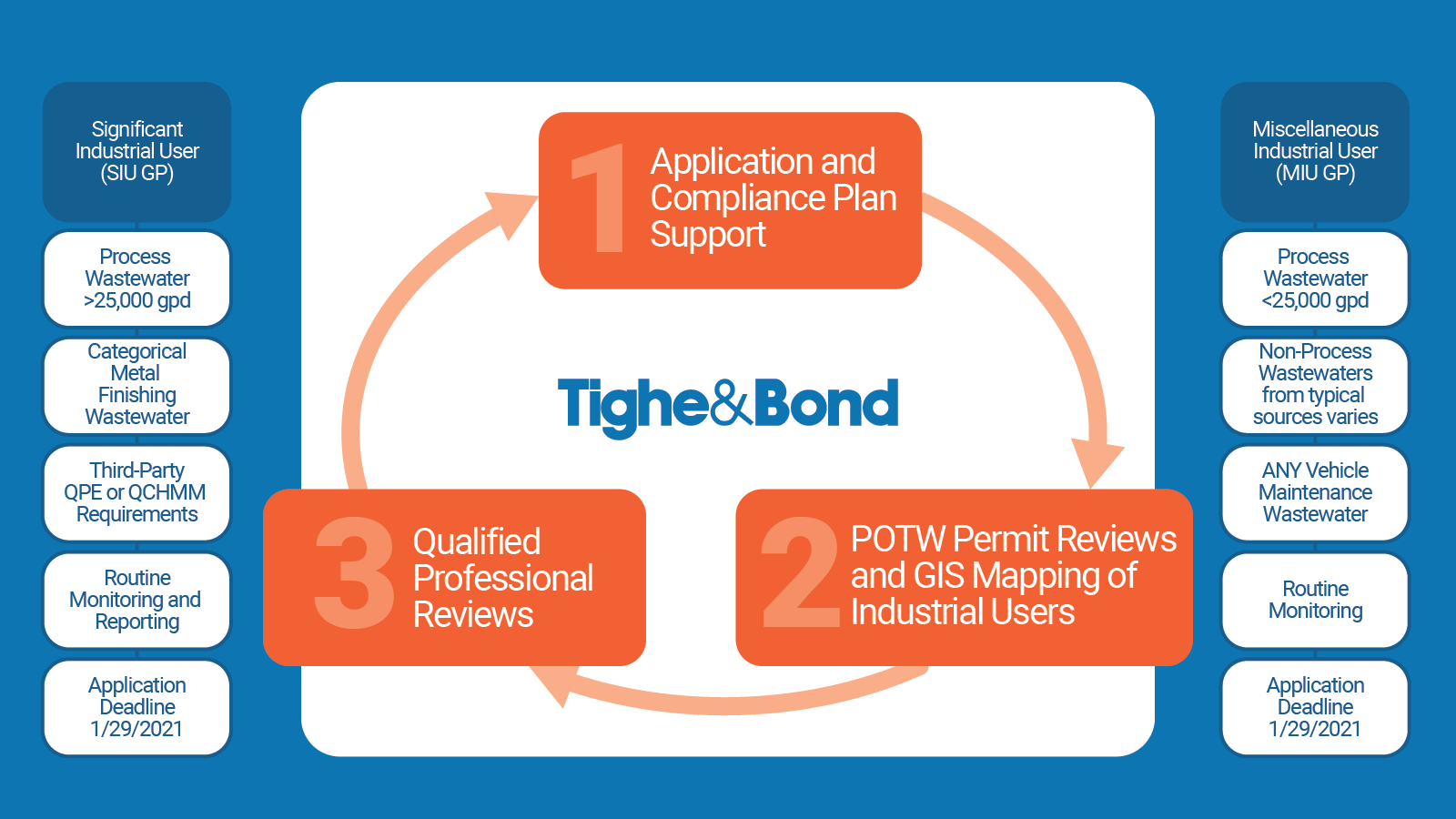Has Your Connecticut Wastewater Permit Expired? Registration & Notification Deadline Has Been Extended to April 2021

If you are a permit holder or a Publicly Owned Treatment Works (POTW) that receives industrial wastewater, be aware that as of October 31st, the following permits with the Connecticut Department of Energy & Environmental Protection (CTDEEP) have expired:
- General Permit for Miscellaneous Discharges of Sewer Compatible Wastewater (MISC GP)
- General Permit for the Discharge of Vehicle Maintenance Wastewater (VM GP)
There are three stages to follow to be in compliance with CTDEEP’s new wastewater general permits:
Stage 1: Application Support and Compliance Plan
For Registrants of the MISC GP or VM GP
If your facility held registrations under the MISC GP and/or the VM GP, CTDEEP requires re-registering under one of two new General Permits:
- For facilities that discharge any volume of metal finishing wastewater or electroplating wastewater, or have an average daily effluent discharge of other process wastewaters greater than 25,000 GPD, registration is required under the General Permit for the Discharge of Wastewaters from Significant Industrial Users (SIU GP)
- For facilities that do not generate metal finishing wastewater or electroplating wastewater but have a cumulative discharge between 1,000 – 25,000 GPD, registration is required under The General Permit for Discharges from Miscellaneous Industrial Users (MIU GP).
Stage 2: POTW Permit Reviews and GIS Mapping for Industrial Users
For POTWs Receiving Industrial Wastewater Discharges
Although CTDEEP provides authorization of wastewater discharges, all facilities which fall under the MIU GP are required to submit Notifications directly to the POTW(s) to which they discharge. This is a significant change from previous wastewater permitting, which typically maintained registration at the state level in Connecticut. POTWs will now be responsible for the receipt of permit notifications, sampling analyses, and any other filings that may be associated with the MIU GP.
Tighe & Bond is working with several local POTWs on developing a comprehensive approach to handling the incoming notifications that will be mailed over the coming months. Tighe & Bond’s GIS team and Regulatory Compliance team are spearheading an initiative to assist towns to more easily receive and track their regulated community. With a combination of online software built into existing accessor data and collector applications utilizing smartphones and tablets, Tighe & Bond is simplifying and streamlining the new requirements facing POTWs.
Stage 3: Independent QPE Review
Do You Have a Qualified Professional Engineer?
Facilities required to submit registrations under the SIU GP will need their application package reviewed, signed, and stamped by a Qualified Professional Engineer (QPE). At a minimum, the QPE cannot be an employee of the registering facility, nor can they be an employee of the consulting firm that assists with the development of the registration or any of the associated Compliance Plans required as part of the registration package. This means that even if registrants of the SIU GP had a consultant develop the registration package or you developed it entirely in-house, they are still required to hire a third-party QPE to review and stamp the registration for CTDEEP approval.
What Types of Wastewater Require Permitting?
CTDEEP splits wastewater flows into two groups (Group I and Group II) based on the type of activity/activities conducted at the facility. If the facility conducts any one or more of these activities, and if these activities discharge to the local sewer system exceeding certain discharge flow limits or is hauled to an approved POTW, notifications will be required to be submitted to the appropriate POTW Authority/Authorities (see flow limits below).
| Group I - Facility Operations* | Group II Wastewater - Facility Operations* |
|---|---|
| Commercial Laundry | Air compressor condensate and blowdown |
| Contact cooling and heating | Boiler blowdown |
| Cutting and grinding | Building maintenance wastewater |
| Food Processing (including breweries and distilleries) | Fire suppression system testing |
| Non-destruct testing | Hydrostatic pressure testing |
| Printing and photographic processing | Non-contact cooling water |
| Reverse osmosis reject water | Potable water system maintenance and sampling |
| Tumbling or cleaning of parts | Swimming pool water and backwash |
| Water treatment wastewater | Vehicle maintenance wastewater |
| *Note that other process wastewaters, including other wastewaters determined by the Commissioner, may also meet the requirements of Group I or Group II discharges. If you have a wastewater discharge not identified in the table above, it is recommended that you contact your POTW and/or CTDEEP to ensure compliance. | |
When is a submittal of notification due?
CTDEEP has extended the original January submission deadline for a notification under the MIU GP and for a registration under the SIU GP to April 29, 2021.
Our team of engineers, GIS analysts, and compliance specialists are available to guide clients through this process. Reach out to our expert Joe Mastrangelo to talk about the next steps for your facility.
Tags: CT DEEP, GIS, POTW, wastewater permits


